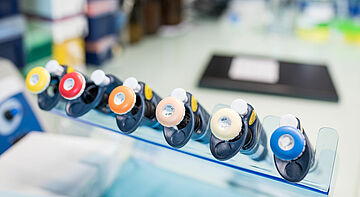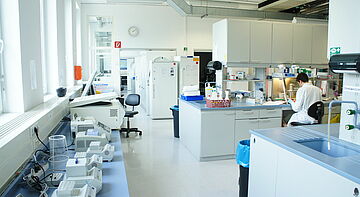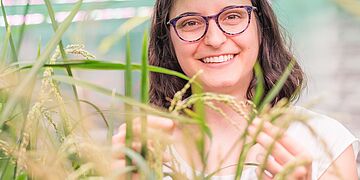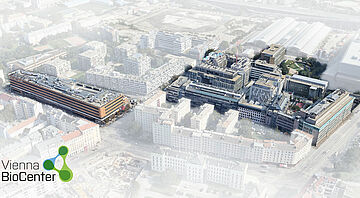Vienna BioCenter PhD Awards
The best PhD theses from the Vienna BioCenter PhD Program defended that year are recognized with the Vienna BioCenter PhD Awards. Four students received the award this year.
Henry Thomas joined the lab of Christa Bücker at the Max Perutz Labs to study how enhancers regulate gene expression. He showed how multiple enhancers work together to activate the Fgf5 gene during differentiation of mouse embryonic stem cells. He also demonstrated that how strongly the enhancers activate this gene depends on how close they are to it in the genome and published his results as first author in the journal Molecular Cell.
David Hoi, from the lab of Tim Clausen at the IMP harnessed the BacPROTAC technology to develop an antimicrobial agent that forces targeted bacterial proteins into suicide. The method, tested on the pathogen Mycobacterium tuberculosis, has a huge potential in the fight against antibiotic resistance. Together with his co-first author Sabryna Junker, he published his results in the journal Cell.
In his study published in Nature Genetics, Bernardo Almeida in the lab of Alexander Stark at the IMP developed a deep learning algorithm that predicts the activity of enhancers from their DNA sequence. The AI algorithm, called DeepSTARR, proved to be exceptionally accurate in its predictions, thereby helping scientists understand how genes are switched on and off. Find out more about his work on his website.
Using neural organoids as her primary research tool, Catarina Martins Costa, a recent graduate from the Knoblich group at IMBA, studied the mechanisms of disease leading to the agenesis – or absence – of the corpus callosum in patients carrying ARID1B mutations. Currently available as a preprint, her main project underscores the potential of in vitro models in elucidating key aspects of human brain development that can provide answers to long-standing questions about the biology of the human corpus callosum and associated diseases.
Out of the Box Award
Max Kellner, from the Penninger Lab at IMBA, was recognized with the "Out of the Box" Award for his innovative approach in studying host-pathogen interactions using novel in vitro organoid systems. Collaborating with the West African Centre for Cell Biology of Infectious Pathogens in Ghana (WACCBIP), his work focuses on developing an affordable platform to study the liver and liver-to-blood stages of the Plasmodium life cycle. This research is pivotal for understanding the initial stages of malaria transmission, where Plasmodium sporozoites first infect liver hepatocytes before progressing to the blood, causing the disease.
Lauwers Award
The Mattias Lauwers Award recognizes a student who has given the best seminar at a Vienna BioCenter Monday Seminar in the previous academic year, as elected by the audience. Josef Roehsner, from the lab of Andrea Pauli at the IMP, received the Lauwers Award this year for his engaging presentation on the regulation of translation in zebrafish embryos. While ribosomes remain dormant in the egg , they must be activated shortly after fertilization for translation to kick-start and for development to proceed. Josef investigates the underlying mechanisms of this sudden change, and whether it also takes place in other cell types.
About the Vienna BioCenter PhD Program
Students in the Vienna BioCenter PhD Program are supervised by top scientists and have full access to state-of-the-art facilities, thus giving them an opportunity to launch a successful scientific career. Here they find the freedom and means to develop a brilliant PhD project. The Vienna BioCenter is extremely dynamic, collaborative, and multidisciplinary with research areas ranging from molecules to populations. The next call for applications will open on 1 March 2024. More here: https://training.vbc.ac.at/phd-program/




